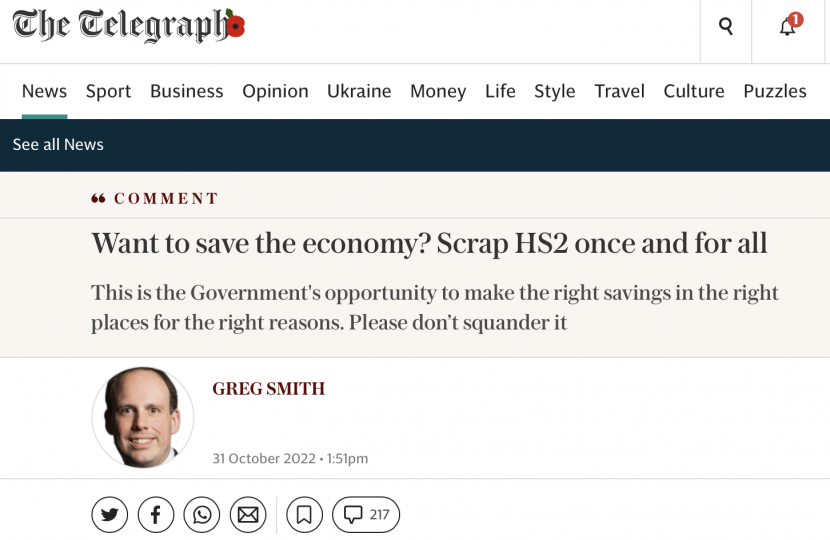
Greg Smith MP writes for The Telegraph...
Rishi Sunak and Jeremy Hunt have been crystal clear about the difficult financial decisions to come. That inevitably means reductions in public spending, which in turn conjures images of the axe falling on politically impossible budgets like health, education, social care and policing. But in an era of difficult decisions, there’s one cut that should be an easy choice: HS2.
The financial incontinence of HS2 was once again under the spotlight last week, with the new Transport Secretary issuing the latest six monthly review. Horror show admissions littered the document, from revelations that contingency budgets are already being burned up, to the waste of £100m on design work at London Euston. “Unexpected” construction costs were blamed, but it was always a fairy tale to believe costs would not go up from the 2019 benchmark on a project that would take in excess of a decade (perhaps two) to deliver.
HS2 is currently on a path to costing the taxpayer in excess of £100 billion, and the true figure is likely to be even higher once the sustained loss in productivity to impacted businesses and the ancillary costs associated with delays caused by the pandemic and inflation are accounted for. That could equate to £307 million per mile.
If this hasn’t already sharpened the Chancellor’s mind, then he should read the latest analysis by Lord Berkley. Allowing for inflation, using indices published by the Office for National Statistics, he has calculated that the cost of HS2 at today’s prices is a whopping £155.52 billion. More significantly, he presents a compelling case that through absorption of existing works into the current railway and road network, with the vast swathes of land that have been compulsory purchased being returned to former owners or sold off, the money lost on this white elephant project can be reduced to just £8 billion, making the overall saving of £147 billion. That is around a third of the Covid debt.
If this project is allowed to continue it will be an albatross around the Government’s neck. Costs will go up and up, with a continued need to find efficiencies within the project’s scope, including the potential for an alternative temporary terminus at Old Oak Common in West London whilst delayed and over-budgeted works at Euston, and on the new tunnel leading to and from it are carried out. Such contingency plans will ultimately have a very disruptive impact on the existing rail network, particularly on the Great Western Main Line, in turn spreading the economic damage far beyond the immediate vicinity of construction.
This is to say nothing of the devastation being caused on a human level by the project within that vicinity. I speak with experience on this. HS2 will run for approximately 19 miles through my rural constituency, parts of which are currently being decimated without due regard or concern for the surrounding areas, none of which asked for such damaging upheaval to these otherwise peaceful and idyllic communities. Arable farms, the beating heart of the rural economy, have at times been made inoperable by construction, as have several other local businesses, including a bus company that transports school children from villages across my constituency. The cost to businesses and the residual effect on the local economy from HS2 remains stark.
Rather, we must prioritise revitalising and upgrading our existing railway network, which would benefit far more people and businesses and would deliver those benefits in a much quicker, more effective, and more tangible way. Those travelling to work or school or for leisure simply want a seat, a fast and reliable internet connection and a toilet that doesn’t resemble the facilities on the final day of a third rate music festival – not to mention the certainty that their train will turn up in the face of constant industrial action. These should and must be the Department for Transport’s priorities, not a multi-billion-pound white elephant.
Likewise, if the case above is not convincing enough, if there was genuine demand for this monster, then why are private investors not falling over themselves to invest in HS2? Their silence and unwillingness to touch it with a barge pole should speak volumes. Furthermore, no test of public opinion has ever proved favourable towards HS2. Looking at the YouGov biannual tracker, since 2019 “strongly support” has never got over 8 per cent. So scrapping it would surely be popular, especially compared to wider public sector cuts.
HS2 remains unviable, unaffordable, and undeliverable. It needs to be scrapped in its entirety. Chancellor – this is your opportunity to make the right savings in the right places for the right reasons, please don’t squander it.
See original article here: https://www.telegraph.co.uk/news/2022/10/31/want-save-economy-scrap-hs2/




